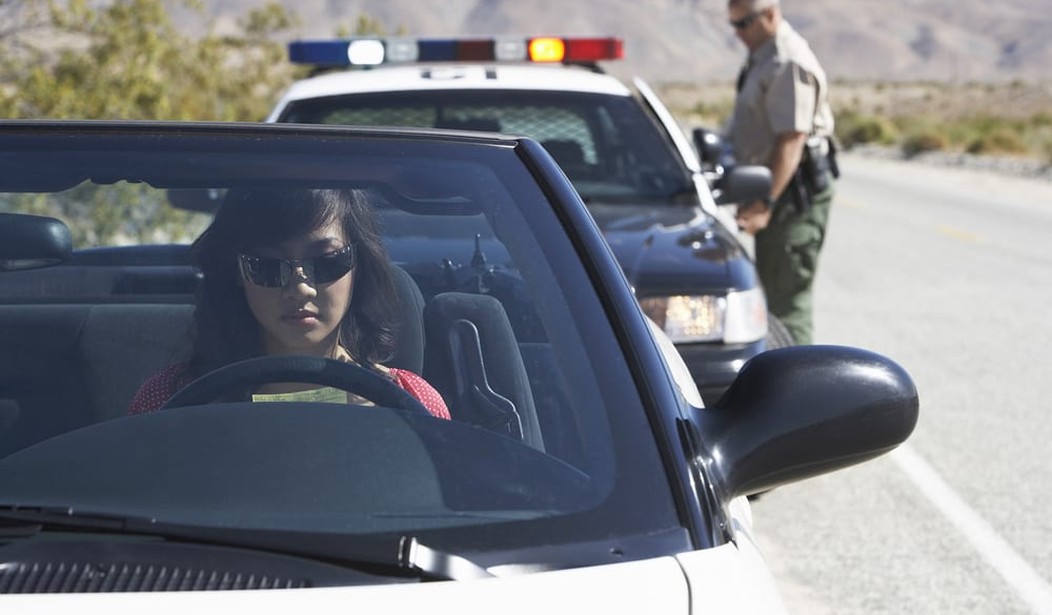I am a fan and a regular reader of the The Federalist, where every day one finds insightful columns on politics and other matters of interest. It’s a broadly conservative website, so I was taken aback on Friday when I read a piece by contributor Matthew Pritchard. The headline was catchy, even arresting, if you will: “This One Simple Change To Traffic Laws Can Reduce Police Brutality.”
Naturally I’m all in favor of reducing police brutality, especially at the purported minimal cost of a “simple change,” so I dove in. Alas, in reading the piece I found that the simple change Mr. Pritchard proposes, while it almost surely would indeed reduce incidents of police brutality, would come at a very high price.
Mr. Pritchard recommends decriminalizing the traffic laws, thereby taking police officers out of the business of enforcing them.
If police are no longer making traffic stops, Mr. Pritchard argues, there are that many fewer encounters with the public where things can go awry. Reduce the number of public contacts, and voila, the number of brutality incidents declines also.
I’m willing to debate the proposal on its merits, but unfortunately Mr. Pritchard doesn’t rest his arguments entirely on the merits, employing some rhetoric more commonly found at Slate or Salon than The Federalist. The piece begins with the premise that because the traffic laws are so voluminous and complex that “to drive is literally to be a criminal,” thus exposing any driver — even you! — to the caprices of heavy-handed police officers looking for an excuse to pull over and terrorize some innocent motorist. And you can well imagine where Mr. Pritchard goes from there. “But when getting pulled over can mean violence or even death,” he says, “the prospect of a traffic stop can be a constant menace.”
And, very predictably, Mr. Pritchard takes us into a discussion of race and the racial disparities he assumes to be inherent in law enforcement:
As anyone who isn’t willfully ignorant knows, that’s the reality facing many black (and brown) Americans today. Poverty dynamics, implicit bias, and a judiciary that has interpreted the Fourth Amendment to place few limits on police discretion all combine to create an environment in which police-related violence has become unacceptably commonplace.
Note the rhetorical device: If you don’t agree with Mr. Pritchard, you must not only be ignorant, but willfully so. Again, you can see this same device employed routinely at both Slate and Salon, but not often at The Federalist.
Mr. Pritchard’s brief bio attached to the piece identifies him as an attorney in the San Francisco Bay area and a former federal public defender, so perhaps the rhetoric should come as no surprise. The bio also says that he “writes about law and government from a classical liberal perspective.” I doubt that John Locke and Adam Smith would endorse the type of racial grievance-mongering on display in the piece.
Grievance-mongering aside, Mr. Pritchard is guilty of what Thomas Sowell describes as Stage One thinking, i.e., the failure to see beyond the immediate effect of one’s utopian vision.
Mr. Pritchard imagines a system in which moving violations are treated in the same manner parking offenses are dealt with today, through an administrative system in which a notice of violation is mailed to the registered owner of the offending car. He allows that serious violations like drunk or reckless driving should remain criminal matters — but this very allowance reveals the folly of his idea.
It is most often the case that drunk drivers are only detected after being pulled over for some minor traffic violation. And, unlike parking offenses, moving violations like speeding and unsafe turns can and very often do result in injuries — sometimes fatal ones — to innocent parties. Yet Mr. Pritchard would have police officers ignore these threats to public safety in the (debatable) cause of minimizing police brutality.
Mr. Pritchard also fails to realize the steps some people would take to avoid even the administrative penalties he proposes for poor driving. If police officers are no longer authorized to make simple traffic stops, what is to prevent some scofflaw from removing the license plates from his car so as to go unpunished for careless driving?
And the author’s naivete is further revealed in this passage:
Ending the practice of using armed police officers to stop drivers based on minor traffic violations would do nothing to impair criminal law enforcement. Quite the opposite — it would free our officers to focus on protecting us from real crime, not to mention lighten the burden on our overworked courts. At the same time, that single reform would do more than any other to reduce unnecessary police-related violence.
Addressing the very real problem of overworked courts, the administrative process Mr. Pritchard hopes to see would surely require some avenue of appeal for those accused of traffic violations, so his idea would merely lessen the workload of one branch of the court system by transferring those cases to some newly created one.
More important, yet apparently unknown to Mr. Pritchard, serious crimes are often committed by people using cars.
Far from doing “nothing to impair criminal law enforcement,” proscribing police officers from making traffic stops would deprive them of a valuable tool that has led to the apprehension of an untold number of felons. Recall that one of America’s most notorious criminals, Oklahoma City bomber Timothy McVeigh, was arrested after a state trooper stopped him for having no license plates on his car.
Reducing incidents of police brutality is a worthy goal, but Mr. Pritchard’s prescriptions would achieve little toward that end, and would do so at far too high a price.









Join the conversation as a VIP Member